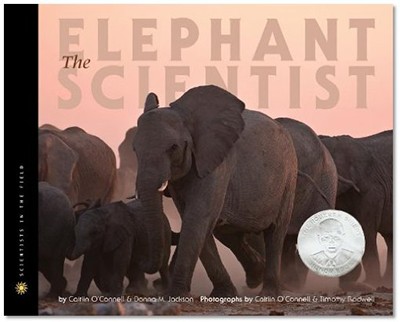November 2013

The Elephant Scientist
By: Caitlin O'Connell and Donna M. Jackson
In the African desert of Etosha National Park in Namibia, they call her "the mother of all elephants." Holding binoculars closely to her eyes, American scientist Caitlin O'Connell could not believe what she was seeing from these African elephants: as the mighty matriarch scanned the horizon, the other elephants followed suit, stopped midstride, and stood as still as statues.
This observation would guide the scientist to a groundbreaking discovery about elephant communication: elephants actually listen with their limbs.
Activities
- Did you know that there is an Elephant Sanctuary in Tennessee? The Elephant Sanctuary in Hohenwald is the nation's largest natural-habitat refuge developed specifically to meet the needs of endangered elephants. The elephant habitat is not open to the public, but you and your family can visit the facility's Welcome Center to learn more about elephants in their care and access cameras streaming live video from inside the habitat. You could also visit their website to download their elephant curriculumincluding activities and lessons relating to social studies, literature, math, and science.
- The Elephant Scientist features a vocabulary page defining terms used to describe elephants. Study the terms with your family to see if there are any words you have not seen before. Reading can be a great way to grow your vocabulary, and you can try to learn the terms you do not know to use in the future.
- Can you describe what Caitlin O'Connell discovered about elephant communication? How did she use her findings to help the farmers in the area where the elephants live? Can you describe the way humans communicate? In what ways do you think our communication is similar to that of other mammals? How is it different?
- Caitlin O'Connell studies elephants today, but her interest in frogs and other amphibians as a young girl encouraged her to become a scientist. Have you ever thought that you might like to be a scientist? Describe what you might like to study if you were to become a scientist. You can visit your local public library to check out books about scientific topics that interest you, and you might discover something you would like to study as an adult!